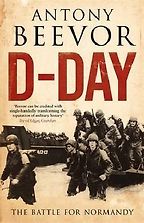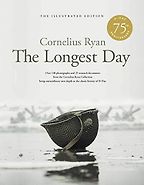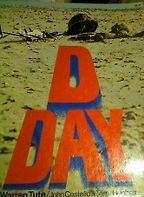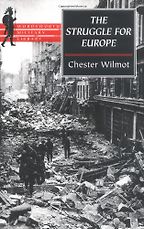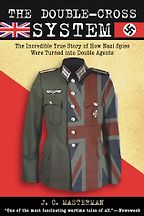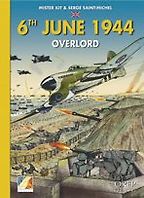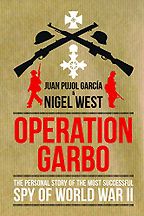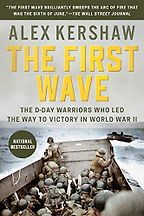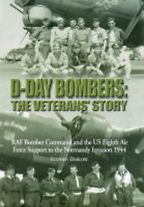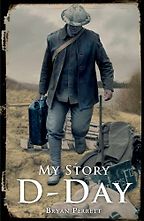Books on D-Day
recommended by historians
Last updated: May 14, 2024
D-Day, the invasion of Nazi-occupied Europe launched by the Allies on the 6th of June 1944, remains the largest and most ambitious land-sea-air operation ever undertaken. If you're new to the subject, a good, readable book to start with is D-Day: The Battle for Normandy, by the bestselling military historian Antony Beevor. It takes you from "The Decision" to go in early June through the liberation of Paris on August 25th, almost three months later. Up to 20,000 civilians died in the Battle of Normandy and Beevor brings alive the horrors of the campaign. Also highly recommended is The Longest Day (1959) by Cornelius Ryan, a short book that's "the ultimate primer on D-Day," according to historian Alex Kershaw. A graphic novel can also be a great way into a subject like this, and 6th June 1944: Overlord, is very clear ('Overlord' was the codename for the Battle of Normandy).
One of the reasons D-Day was successful was the Germans weren't expecting the Allies to land in Normandy. There are also a number of great books about the double agents that enabled the Allies to pull off this extraordinary deception.
Our recommended books on D-Day are listed below, but if you'd prefer to watch a docudrama instead, there's the BBC's D-Day: 6.6.1944, directed by Richard Dale.
D-Day: The Battle for Normandy
by Antony Beevor
It was a long time in coming: a new front to challenge Hitler from western Europe (to help the Russians fighting in the East) and much hinged on the success of the D-Day landings. D-Day: The Battle for Normandy, by military historian Antony Beevor, starts in Southwick House (near Portsmouth), where Eisenhower made the difficult decision to proceed on June 6th, 1944, in spite of the choppy weather. The book takes you through the landings on the Normandy beaches and also the terrible fighting that took place in the three months afterwards. If you are visiting the Normandy beaches, this is an ideal book to take along.
(You can also read our interview with Antony Beevor, about his favourite books on the Second World War.)
“A lot of people know about The Longest Day because it became a very expensive (and long) movie but it’s actually a pretty short book. You can read it in the time it takes you to get across the English Channel on the ferry. So if anybody is going to the Normandy beaches, they can just take The Longest Day. It’s the ultimate primer on D-Day and you can read it while sipping a beer or cup of tea in the bar on the cross-channel ferry. Cornelius Ryan interviewed hundreds of people for the book. It’s almost history as pointillism. He had access to an enormous amount of information. He sent out questionnaires. If you look at the Ryan archive, it shows you all the material that he gathered for The Longest Day, and it’s really impressive…as an introduction to D-Day that gives you the overall picture, that captures the drama and the enormity of it, and the heroism, and covers the German side as well as the Allied side, there’s nothing better. And I don’t think there ever will be.” Read more...
The best books on World War II Battles
Alex Kershaw, Historian
D-Day
Warren Tute and John Costello
D-Day by Warren Tute, a naval officer who took part in the Normandy landings, and historians John Costello & Terry Hughes is a book that was put together for the 30th anniversary of the D-Day landings in 1974. It’s the illustrations that are the book’s biggest selling point: the book opens with a facsimile of a letter from Eisenhower to the troops, you can see newspaper headlines from the time (“INVASION: Allies Land in France, Smash Ahead; Fleet, Planes, Chutists Battling Nazis”), as well as cartoons, maps and fabulous photos.
The Struggle for Europe
by Chester Wilmot
Chester Wilmot was an Australian war correspondent. The Struggle for Europe (1952) is his journalistic and highly readable account of World War II which has also won the admiration of military historians. Michael Howard writes in the introduction that it is “a book which deserves to rank as highly as a journalistic scoop as it does as a work of history.” Although the book starts with Dunkirk and covers the entire period until the victory in Europe, D-Day is the subject of the whole of Part II of the book, and covers it in detail.
“It’s one of the great unsung victories of the Second World War. The double agents were used to convey a vast quantity of lies to the Germans. This network played a critical part in the run-up to D-Day by throwing huge amounts of disinformation which was swallowed more or less whole by the Germans. Masterman was in charge of this committee which decided what could safely be fed to the Germans. They fed a combination of what they called ‘chicken-feed’, true information which was essentially non-nutritious, and a smattering of completely false information that would lead them in the wrong direction. Masterman’s account of the double-cross system is the definitive account and, although it’s written in quite a dry way, it’s absolutely thrilling.” Read more...
Ben Macintyre, Journalist
6th June 1944: Overlord
by Master Kit & Serge Saint-Michel
6th June 1944: Overlord is a fabulous graphic novel about D-Day and the landings on the Normandy beaches. It opens in April 1944 with the run-up and preparation for Operation Overlord and goes right through to the liberation of Paris on August 25th, 1944. It shows you what was going on on the different beaches (Utah, Omaha, Gold, Juno, Sword and Pointe du Hoc), and follows different stories. There are maps and nice details, like the German commanders delaying and losing vital hours because they didn’t want to wake up Hitler, who was a notorious late riser.
As the cover advertises (in our edition) it’s ‘the entire history of the D-Day landings in just 82 pages.’
Operation Garbo
by Juan Pujol with Nigel West
Spanish double agent Juan Pujol (codename: Garbo) was the one who managed to persuade the Germans that D-Day was actually a diversion and that the main attack would be elsewhere. “And they believed him. They had their troops elsewhere and if that had not been the case there is no way the Allies would have managed to open up the Western Front.”
“I also did another book about D-Day called The First Wave which was just an unashamed ‘Greatest Hits’ approach. I just picked my favorite guys from the Canadians, the Brits, the Americans and even a Frenchman. I decided, ‘I’m just going to tell this incredible story but tell it up close and personal from the point of view of my eight stars and really go to town.’ There wasn’t a lot that was enormously new but the angle there was somewhat innovative in that I took the combat leaders who were in action first, who had the most critical missions. They landed first—either from the air or the sea—and if they didn’t succeed in the first minutes or hours of D-Day, then the whole operation would have failed. So it was an interesting approach and I got to hero worship some really cool guys. There’s nothing wrong with hero worship when it comes to people who were prepared to die to save everything that we care about.” Read more...
The best books on World War II Battles
Alex Kershaw, Historian
D-Day Bombers
by Steve Darlow
Steve Darlow is the grandson of a Bomber Command pilot and military aviation expert. He spoke to Five Books about the best books on the pilots of the Second World War. D-Day Bombers is based on his interviews with more more than a hundred RAF crew and offers their eyewitness accounts of this crucial part of the campaign.
D-Day: My Story
by Bryan Perrett
The My Story series is an excellent way for 8-11 year old children to learn about history. In D-Day: My Story, a fictional lieutenant takes part in the D-Day landings and the fighting in Normandy.
